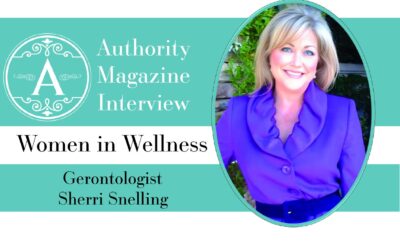Available Now!
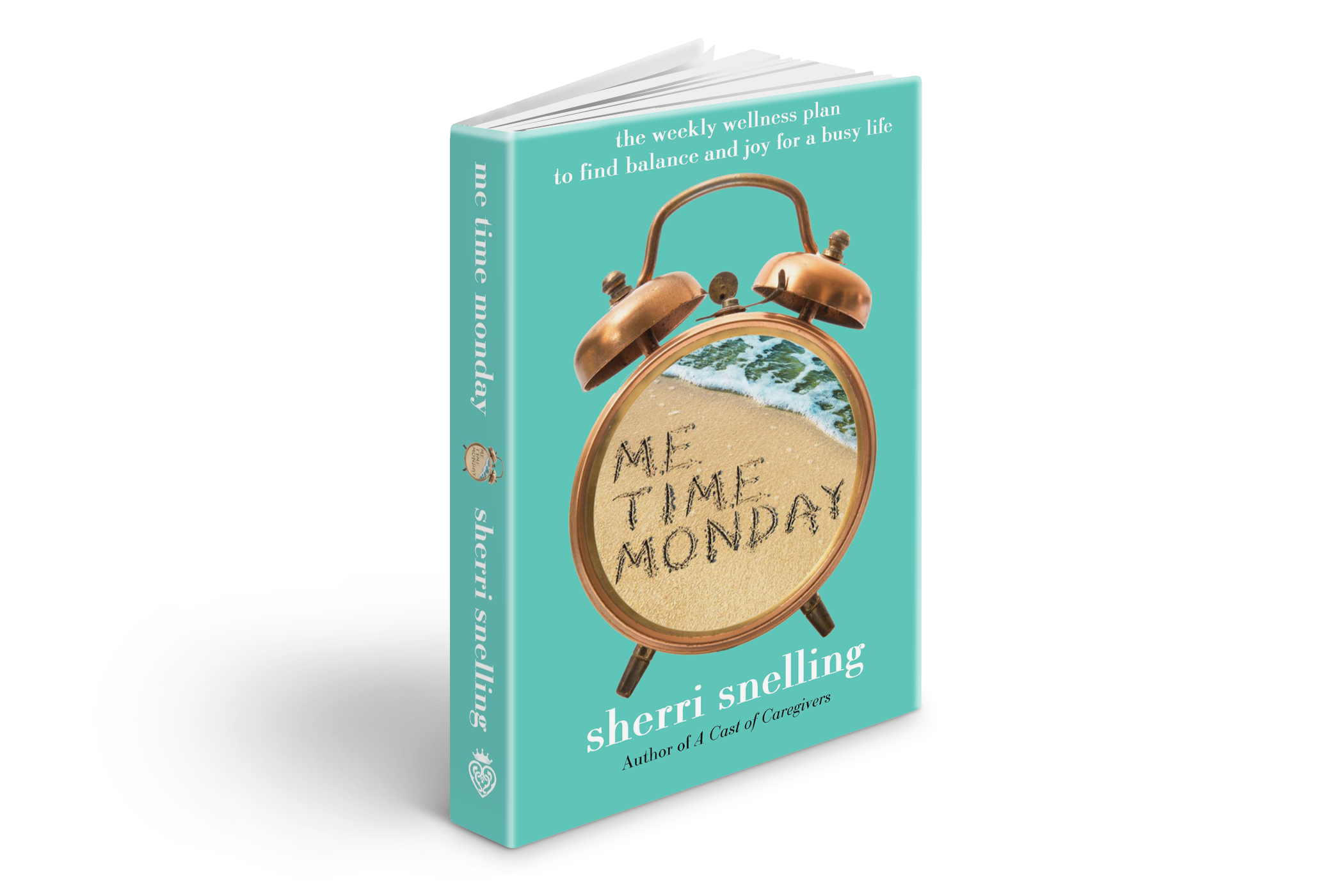
“A gerontologist offers a robust examination of self-care for caregivers.” –Kirkus Reviews
If your life is out of balance, Me Time Monday guides you back to well-being offering science, stories and solutions using 7 ways and 7 days to Marie Kondo your life for better health and more joy.
“The book we’ve been waiting for!”
“This is self-care made simple.”
“A life-changing wellness routine.”
“I recommend this book to everyone and live by the advice each Monday.”
About the Book
ARE YOU AS HAPPY AND HEALTHY AS YOU WANT TO BE?
If you have ever felt stress, anxiety, depression, choice overload, tech tyranny or that your wellness self-care plan is just a self-defeating exercise – you are in the right place! Despite the overwhelming amount of information on how to achieve well-being, each year studies show we are less happy and less healthy. We can blame pandemics, politics and other societal problems but there is no cleanse diet, meditation app or exercise plan that can solve a life out of balance.
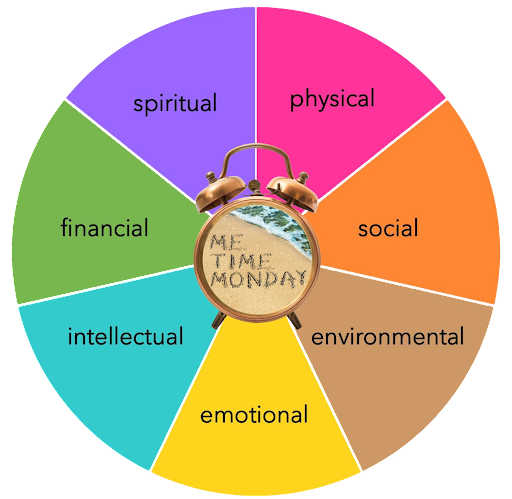
In Me Time Monday, gerontologist Sherri Snelling shows you that finding a balanced life is simpler than it sounds, even for family caregivers who have no time for “Me Time.” The journey to joy is a fact-filled, fun ride where you will use a Monday start 7-day routine to navigate 7 ways to wellness: Physical, Emotional, Social, Intellectual, Environmental, Financial and Spiritual.
Showcasing brain science solutions for proven well-being, you will forget FOMO and find Flow and JOMO (joy of missing out); create a brain health exercise plan; learn how to harness feel-good hormones; explore biophilic nature design for your home and office, find ways to crack the anxiety code; gather your social convoy and find your tribe, grow your gratitude and spirituality plus understand how sleep requires less blue light and more pink noise and how a nutritious diet is based on rainbows and sunshine. Me Time Monday turns wellness on its head helping you navigate through the marketing hype and clutter to tap into the neuro-happiness of nature that provides a pathway to a personalized, practical self-care plan you can achieve in just a few minutes every day and every week for a joyful life.
Book reviewers request an ARC via email: info@caregivingclub.com
Advance Praise for Me Time Monday
“A gerontologist offers a robust examination of self-care for caregivers . . . Snelling, a gerontologist who studies aging . . . identifies seven ‘elements of wellness’—physical, emotional, social, intellectual, environmental, financial, and spiritual—and offers insights on sleep, diet, ‘good vibrations,’ and the transition from ‘FOMO’ (the fear of missing out) to ‘JOMO’ (the joy of missing out). The author offers plenty of helpful reminders and teachings. . . [in] an often useful . . .self-help book.”
-Kirkus Reviews
“The book we’ve been waiting for! Me Time Monday is a refreshing compilation of wellness ideas that are actually practical and achievable. Snelling’s wit and positive outlook keep you hooked with the content. You will have renewed hope for your own wellness journey after reading this. ”
—Brooks Kenny, MPH, executive consultant & speaker on women’s health; former Vice President Consumer Engagement, UsAgainstAlzheimer’s
“Me Time Monday provides the research, the inspiration and the strategies for creating balance and cultivating joy in our daily lives. Sherri cuts through the marketing hype to distill the proven strategies and practical tactics to create a life-changing wellness routine”
—Katy Fike, Managing Director – Generator Ventures
“Caregivers of all kinds – professional or family – can tap Sherri’s wisdom to find more balance and well-being for their clients, their loved ones and themselves as they age. ”
–-Susan Donley, Sr. Vice President, Communications & Marketing – LeadingAge
“Who better than an expert on life’s ultimate stressful stage (family caregiving) to gently guide all of us toward better balance and the nourishing wellness we need and deserve?
This is self-care made simple.”
—Paula Spencer Scott, author, Surviving Alzheimer’s: Practical Tips and Soul-Saving Wisdom for Caregivers
“I recommend this book to everyone and live by the advice each Monday. Sherri has provided a conceptual framework to look at vitality, health and wellness that can benefit each one of us. especially those who are or will become caregivers.”
— Mary Furlong, author, Turning Silver Into Gold : How to Profit in the New Boomer Marketplace and producer of “What’s Next Longevity” Summits and Podcast
“Give yourself time to read Me Time Monday and you’ll be glad you did. Sherri Snelling, one of the nation’s foremost caregiving experts, shares smart advice to find balance in your life, especially if one of your responsibilities is caregiving. Her section on Financial Wellness is especially useful because it’s a vital money topic that we often overlook.”
— Richard Eisenberg, former Managing Editor, Next Avenue (PBS)
Me Time Monday Book Events & Interviews

Book Signing Events:
Kensington Senior Living
Sierra Madre – Saturday, August 19
Webinar – Wednesday, August 23
Redondo Beach – Saturday, September 20
Author Sherri Snelling has been interviewed by the following media about her book:
Longevity Book Club – Stanford Longevity Center
Watch the Me Time Monday Minute Videos

Watch the Book Trailer Now
“Behind the Book” videos – Sherri answers 7 questions from readers about her new book
Me Time Monday Workshops
Option 1
90-Minute Webinar or Workshop
Overview of Me Time Monday
Quick View of 7 Elements of Wellness
Q&A with audience
Delivered virtually or in-person

Option 2
8-Week Virtual Workshop
(Intro and 7 Weeks of Wellness)
Delivered weekly in 90-minute sessions
Deep Dive on the 7 Elements of Wellness
More Interaction with the audience – survey, and discussion on results
Virtual workshops for individuals or groups
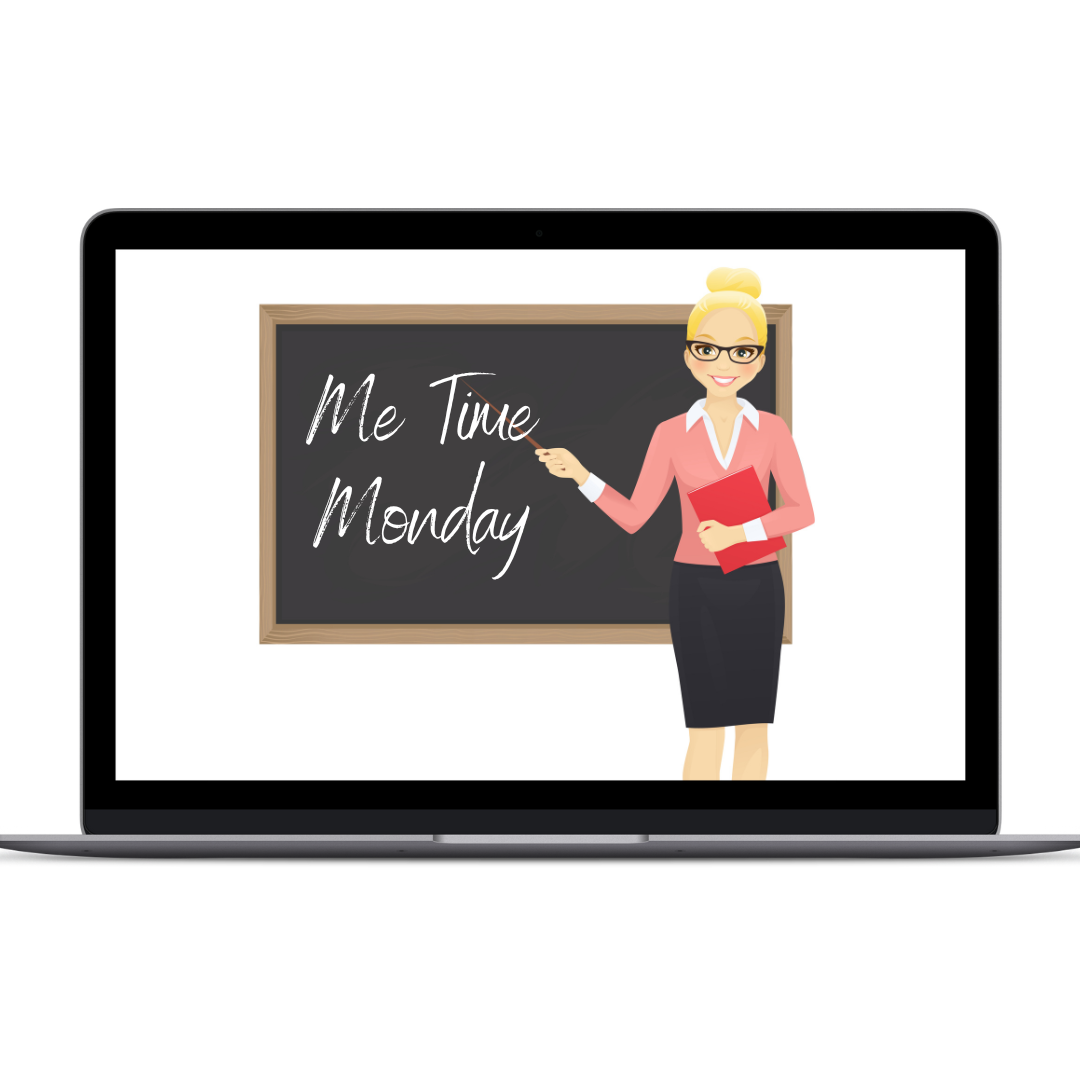
About the Author

Book Sherri
To Speak
Sherri Snelling is a corporate gerontologist, “authorpreneur” and founder/CEO of Caregiving Club, a strategic consulting and educational content creation firm with an expertise in caregiver wellness, well home design and brain health/Alzheimer’s. She is the host of the podcast, “Caregiving Club On Air,” producer/host of the cable reality TV show, “Handle With Care” and author of Me Time Monday – The Weekly Wellness Plan to Find Balance and Joy for a Busy Life and A Cast of Caregivers – Celebrity Stories to Help You Prepare to Care.
Snelling writes articles for various online news outlets and serves as an on-air aging wellness expert for TV and radio news. She advises Fortune 1000 companies and start-ups in the longevity economy on caregiving and wellness programs as well as on well home and office interior design. She also conducts caregiver wellness educational workshops and webinars for employer groups and other organizations and speaks internationally on topics from her books. Snelling has served on aging and caregiving advisory committees for the White House, the Center for Disease Control & Prevention (CDC), Centers for Medicare and Medicaid Services (CMS), Alzheimer’s Association, the National Institute on Aging and Georgetown University. She also is a mentor for the Techstars and Pivotal Ventures longevity start-up incubator program.
Snelling has a master’s degree in gerontology from USC Leonard Davis School of Gerontology and master’s certifications from MIT Sloan School of Management on “Shaping the Jobs of the Future” and Harvardx on “Happiness Psychology.” She lives in Newport Beach, California.
Q&A with the Author of Me Time Monday
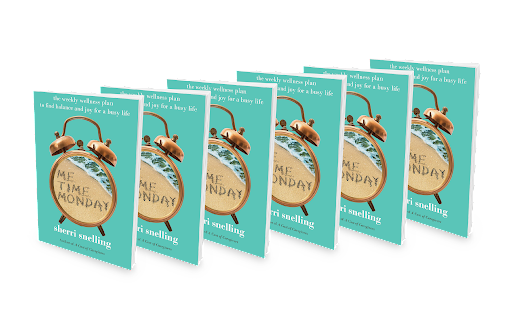
Authorpreneur, Sherri Snelling, answers 7 key questions about her new book.
You say your Me Time Monday book is creative non-fiction – please explain this?
Creative non-fiction books are a hybrid genre that pull in elements of fiction including literary techniques blended with the writer’s perspective and expertise on a subject as well as factual information.
For instance, in Me Time Monday, I use the literary techniques of metaphors and storytelling:
- Metaphors in the book include: JOMO – the joy of missing out; 4 Hormones Against the Apocalypse; the Pajama Class
- Each section of my 7 Wellness Elements begins with an intriguing story to engage the reader in what they are about to learn in that section. I think my favorite story of the seven I write about is the one of the skeletons found in Italy that exemplify Social Wellness and our need to have love, trust and support in our lives – it is a symbol of our ancient need to bond with others.
I also provide my expert perspective on caregiving, aging and wellness:
- Gen C Continuum – caregiving, including self-care, is constant throughout our lives
- Wellness is a holistic practice that achieves balance in body, brain and soul and has little to do with the consumerism, hype and self-defeating practices you see everyday
Finally, as a gerontologist I have an expertise in aging across the lifecourse, caregiving and wellness but in the book I try to let the reader into the science of evidence-based research that back up my position on how wellness is defined and how it should be practiced:
- I read more than 450 peer-reviewed research articles, books, industry reports, news articles and watched numerous conference panel discussions and film documentaries as well as interviewed more than 20 worldwide experts in different areas of wellness to inform and validate my position on how to approach wellness and practice a lifestyle that brings more balance.
How do you define wellness and what is the Joyconomy?
In Me Time Monday, I help the reader see that wellness is not about solving problems but about building strengths. This is an important distinction that is in opposition to a lot of the marketing messaging out there right now about wellness. Anyone who is in the wellness business or positions themselves as a wellness expert should be instructive not prescriptive because wellness is a personalized pursuit – it is not a one-size-fits-all lifestyle which is what a lot of the messaging I see out there today is peddling.
The other important part of wellness is that it is not about a new trendy diet or cleanse, a new version of yoga or just meditating more which is what most people think. It is about balance and ultimately how balance in life brings us more JOY. I write that 100 years ago when we experienced the Roaring ‘20s after a global pandemic, horrendous world war and economic uncertainty, we embraced music, dance, laughter, celebrations and the pursuit of happiness. We are in the Roaring ‘20s 2.0 which is why I call this an era of the new Joyconomy. I want my readers to pursue life goals and dreams and invest in their happiness and joy. We cannot control most economies but we can take control of our own happiness which is our personalized Joyconomy.
Tell us about your concept behind Gen C Continuum and Generation Caregiver?
Gerontological research can be looked at a lot of different ways such as longitudinal studies that track the same cohort over a period of time (Harvard Adult Development Study mentioned in the book) versus a cross-sectional research study that looks at various groups who experienced something simultaneously and what the impact was at that moment in time (e.g., COVID-19 studies on caregiver burnout and emotional distress during the pandemic).
I believe a demographic approach to caregiving studies is important but it also overlooks the even more important psychographic data. Essentially, demographic research is based on age, gender, where you live or socioeconomic status to define why things are happening with a certain group like caregivers. Psychographics is an approach that comes from marketing analytics and focuses on behaviors, needs, attitudes. It is the psychographics that help get us closer to solutions and support.
I choose to focus on psychographics in my Gen C (Generation Caregiver) Continuum because it is a longitudinal look at life – it is about our relationships which we know are a key to living healthier, happier and longer – and those relationships (which can be mutual or with a giver and a receiver) – create our caregiving roles which are a constant throughout life. But underlining all of it is SELF-CARE. From our earliest years to later years, the self-care is how you achieve balance in life and yet this is the “care” role we often neglect when we become caregivers. I want to show caregivers how important a balanced life is in being a caregiver and recognize it is not easy when life’s challenges hit us but self-care can still be practiced in small ways that have big rewards.
Also, I felt in my first book, A Cast of Caregivers, I was focused on the demographics and the “what” part of caregiving. With my second book, Me Time Monday, I expand on the self-care chapter from my first book and start to help readers understand the “why and how” part of caregiving, self-care and creating a life more in balance.
You call yourself a neuroscience nerd and certainly brain health and how our brains work are woven throughout the book. Tell us why you feel neuroscience and brain health is so important for caregiver self-care?
I have always been fascinated with how our brains work and how the brain is the driver for so much of our well-being. I feel it is one of the last great frontiers we are still exploring. Also, a lot of my work is in the Alzheimer’s and dementia community which is one of our most mysterious diseases dealing with the brain that we are trying to conquer.
When I was pursuing my master’s in gerontology I learned about the ancient part of our brain and how our stress responses and ability to feel calm and safe are often tied to our ancient beginnings on the African savanna 2-3 million years ago. This was fascinating to me because so much of science is about the “new” discoveries rather than going backwards in history to find the answers. And yet, again and again as I was delving into wellness research I was finding older science and methods may have been dusted off for modern audiences but are still the basis for what helps our well-being and pursuit of happiness today.
Also, it is critical to understand neuroscience which is how the brain functions but also our multisensory lives where sight, sound, smell, touch and taste play key roles in wellness. With so many reports before, during and since the pandemic about mental health and emotional health for caregivers, I felt this was an opportune time to educate readers more about brain health and how it is tied to these areas of well-being. Also, brain health is tied to nature so the twin themes of neuroscience + nature really became the basis for my book and the rationale for all the recommendations, tips and insights I provide to readers in Me Time Monday.
So that brings us to the logo for Me Time Monday which is the analog copper alarm clock with no numbers or hands on the clock just an ocean wave inside – how did you choose this image?
One of the reasons I used the older clock as my motif for time is because you will find
the wellness teachings of history are timeless – what wellness practices were important hundreds and thousands of years ago are still relevant and impactful today. My mission with the book and my Me Time Monday workshops is to get people back to the basics and away from tech tyranny that is hurting our well-being. It is not to say tech is bad, but our bodies and brains are still adapting to all the technology in our lives. Remember we only discovered electricity a little over a 100 years ago and human evolution doesn’t move that fast, it takes hundreds and thousands of years for our bodies to adapt. This means to achieve a life in balance means the more tech you use, you need to have more nature in your life. So instead of a modern digital clock, I chose the “old-fashioned” copper clock as a symbol of timeless well-being.
The other psychology behind the clock is when we are focused too much on numbers (weight, age, minutes exercised, calories eaten, how many friends on social media) we see how meaningless those numbers really are when it comes to long-term happiness. I also feel that clocks are often about a structured life but not a life in balance. Sometimes we have to free flow and let it go – just be in nature or just daydream or just enjoy life without boundaries of time.
The logo also reminds readers to be resolutionaries. Don’t be bound to New Year’s Resolutions or short-term goals for wellness. With true wellness there are no deadlines. Look at wellness as a lifestyle not an annual goal. By releasing yourself from the constraints of time, you become a wellness resolutionary.
And finally, the ocean inside the clock is about the beauty of nature and serenity of the multisensory experience of the beach. Some people may define their Me Time Monday scene as the mountains, desert, lake or gardens but for me – because I grew up at the beach and it makes me feel calm, connected and creative – I love the beach scene. And to reiterate, Me Time Monday is personalized to each of us. For me it is the beach, but others can take the clock and insert any nature or other scene that makes them feel joy.
You write a lot in the book about how wellness is based on nature but you also talk about the power of 7 and you use the 7 colors of the rainbow as part of color psychology – how does this all relate to caregiver self-care?
A majority of the book is based on science and solid facts proven through research. But we know there is the scientific world and then there is the spiritual world. To have balance in life we have to embrace both worlds. Science is about the exploration and search for truth of our physical universe in all its diversity and complexity. Spirituality is about seeking answers for all the unknowns of science. If science awakens the mind, spirituality awakens the soul. It is one of the reasons Spiritual Wellness is one of my 7 elements of wellness. You cannot have a life in balance without a sense of your spiritual wellness.
In my research for the book, I found amazing science behind spirituality and the number 7 as an influence in our life balance. The numeral seven also aligns with the Monday starts of a Me Time Monday routine – every seven days you get a new lease on life. As for rainbows, and again the 7 colors of the rainbow, I am fascinated by the neuroscience in how our brains interpret color and how those colors influence our well-being. Again, ancient wellness practices used color psychology and chromatherapy which I explore through the research and expert interviews in the book.
Who will benefit from this book?
I always start my books thinking about family caregivers. They are the massive volunteer army of millions of Americans that keeps the health care and long term care systems going. But often, they neglect their own needs so anything I can do to help them find just a few minutes for themselves is what I have focused on for more than 18 years.
However, in writing this book, I believe it will really resonate with anyone who is an adult because wellness, like happiness, is a lifelong pursuit for all of us. You can be 18 or 80 and get something from this book (trust me my 22-year-old nephew and 79-year-old Mom all found information in the book that related to them.)
I think the book will resonate with a large audience who is interested in wellness in general. And for the caregivers, who I realize have no time to read or add anything more into an overwhelmed schedule, maybe read a page a week or jump to a section you want to know more about like sleep science but don’t feel you have to read it front to back in any set limit of time. Again, Me Time Monday is about microflows (baby steps) and in practicing the kindness, gratitude and comfort we give to others for ourselves.
Happy Reading!
Me Time Monday Blogs
Super Bowl Sunday Special: Why Tom Brady Trained His Brain as Much as His Brawn
(the following is adapted from Sherri Snelling’s book, “Me Time Monday – The Weekly Wellness Plan to Find Balance and Joy for a Busy Life”) Millions of Americans and viewers worldwide will crowd around TV sets in bars and at home to watch the gladiators of the...
2024 – The Year of Living Colorfully and Creating Your Own Personal Joyconomy
Last year with the debut of my book, Me Time Monday, one of the concepts I wrote about is a perfect theme for the New Year. It is about the new "joyconomy" and how your happiness is in your hands. In fact, happiness and joy, may be the only things we do have control...
Sherri Snelling Featured in Authority Magazine
Authority Magazine, a Medium publication devoted to sharing in-depth, and interesting interviews, features people who are authorities in Business, Pop Culture, Wellness, Social Impact, and Tech. Authority Contributor, Maria Angelova, recently interviewed Sherri...
Copyright ©2023 Sherri Snelling. | Terms and Conditions | Privacy Policy







